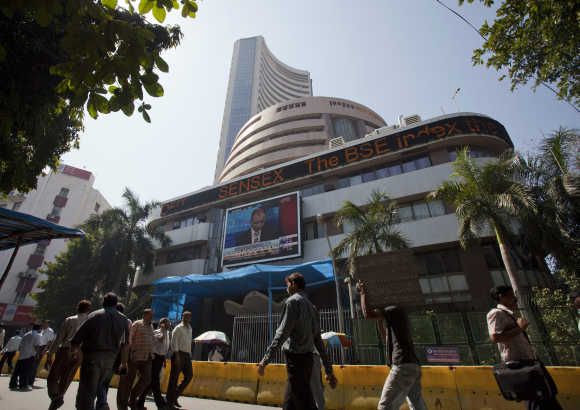
US election results may not reverse Indian markets’ bearish trend, says Devangshu Datta.
Data-driven analysis implies that the immediate response to the US election results doesn't necessarily set up a long-term trend. A Bloomberg analysis that goes back to 1984 indicates that it has not happened very often.
Bloomberg looked at the broad US stock market index, the S&P 500 movement the day after the vote versus the return over the next 12 months. That's only eight paired data points, so drawing firm conclusions would be inadvisable.
The markets moved the same way short-term and long-term, in 1996, in 2000, and 2004. In 1996, Bill Clinton won the re-election and the index rallied and continued to rally. In 2004, the market rallied on George W Bush's re-election and it continued to rally.
In 2000, the market dropped and continued to plummet for the next 12 months. That election pitted George W Bush vs Al Gore. If you remember, it came in the middle of the bursting of the Internet bubble and a confusing recount of votes in Florida. A Supreme Court judgment finally awarded the presidency to Bush. The market moved down and then, 9-11 happened. In the other five elections since 1984, the S&P 500 lost some ground initially. That was followed by a rise over the next 12 months.
It is possible that the pattern will be slightly different this time. However, the long-term pattern appears bearish. The Federal Reserve is expected to hike rates again in December and, going by the bond market, the global economy is likely to react badly to tightening liquidity. In any event, global GDP growth continues to be slow. China has seen exports slipping in October, which is a pretty bad signal.
The impact on India could be interesting. The Nifty is well-coordinated with the US markets (if adjusted for the time-zone differences by comparing Nifty movement with the previous day's US session).
The long-term correlation is also strong. If the Fed does hike the USD policy rate in December and if the global economy does see a correction due to that hike, India will also be affected. India may be among the fastest-growing economies in the world at the moment but in absolute terms, it is growing much slower than investors would like.
The pharma industry for instance, is under investigation by the US Justice Department for alleged cartelisation and price-fixing for generic drugs. The President, whoever it may be, would not interfere in that process, and Indian generics firms make over 50 per cent of their income from the US. Contingent liabilities if those charges are proved could run into the billions.
The IT industry could continue to suffer from a combination of higher H1B visa costs, and changes in the services model wrought by the development of AI (artificial intelligence) and cloud computing. The viability of the outsourcing model is in itself, questionable.
India and the US have also fought a recent legal battle about the domestic content requirements of the Indian solar mission. The WTO sided with the US in agreeing that the domestic content requirements would illegally discriminate against imports.
So the bearish trend that has developed over the past month or so will not be affected by the US election results.












 © 2025
© 2025